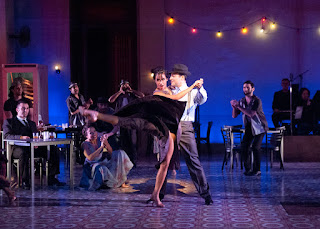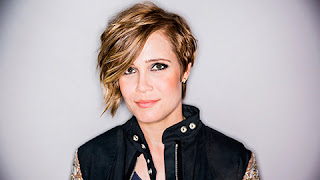Disney Fantasia: Live in Concert featuring Czech National Symphony Orchestra, licensed by Disney Concert Library, copyright Disney
I was quite disillusioned when I was a child and my parents took me to Fantasia.
Why?
Because there were no words. Why ever would anyone make a cartoon without words? I was furious with the producers. Imagine, a cartoon without words. The nerve.
And yet, and yet...I was captivated by the visuals and sounds of the Sorcerer's Apprentice, remaining etched in my mind for decades, the message, the music, Mickey scrambling, and I can bring it to life there again if I think about it.
Oh! To hear the music played by a real orchestra with the film whirring on screen would be utter delight and that's exactly what happened at the George Mason Center for the Arts when Disney presented the film and the Czech National Symphony Orchestra played the music.
For the performance, Disney fused the two Fantasias of 1940 and 1999 into one really big show and brought the animation back with classical music for a momentous ride through magical forests and clouds and sky, floating as we were amidst pastel colors with dreamy-like persons flying through the air, skimming tree tops, and dashing from volcanoes.
Much of it could be quite scary for children, I thought in my adulthood, but few were there at George Mason, perhaps because the show began at 8 p.m. Scenes with great big red monsters and mammoth-sized snakes streaked the screen, enough to produce shrieks, but none were heard from the sold-out audience which applauded often and emitted only bits of adult laughter now and then after a comical scene.
The orchestra played portions of Tchaikovsky's Nutcracker Suite, Beethoven's Symphony No. 5 in C minor, Stravinsky's 1999 Firebird Suite, Camille San Saen's Carnival of the Animals complete with Donald and Daisy Duck and Noah's ark, and, of course, my favorite, Dukas' Sorcerer's Apprentice, and other works.
(Omitted from the program, sadly, ("Programs and artists subject to change without notice") was another all time favorite, Debussy's "Clair de lune.")
The Czech Orchestra only began in 1993, and brought 68 musicians to play on its U.S. tour. Conducting was Ted Sperling, the principal conductor for the Westchester Philharmonic, who also is a stage director, performs at Lincoln Center and Carnegie Hall, and sings, plays the piano, violin, and viola and orchestrates for Broadway, that's all.
He presented a broad smile whenever he turned to face the audience which did not fail to respond enthusiastically to his baton.
Never have I been disappointed in any production at George Mason and that includes the one-act show by adjunct professor, Kaiulani Lee, as Rachel Carson in A Sense of Wonder. I wonder why she's not on stage 365 days a year, twice a day, delivering the powerful message, especially during these dangerous times of climate change. (Wake up, World! I think the rest of it has, but the U.S.? To listen to most of the Republican presidential candidates, no.)
George Mason's Center for the Arts has many fantastic upcoming performances in its playbook. To see all of them, click here. Below are a few:
March 13, 7 p.m. Pianist Jeffrey Siegel plays Beethoven's final Piano Sonata and other works. Tickets from $24.
March 20, 4 p.m. For St. Paddy's Day and direct from Ireland, Celtic Music, dancing, and storytelling. Tickets from $29.
April 16, 8 p.m. Moscow Festival Ballet performs Giselle. Tickets from $34.
April 17, 4 p.m. Moscow Festival Ballet performs Swan Lake. Tickets from $34.
April 23, 8 p.m., and April 24, 2 p.m. Virginia Opera presents the Flying Dutchman. Tickets from $48.
April 30, 8 p.m. Fairfax Symphony Orchestra plays Beethoven's Eroica with pianist Awadagin Pratt. Tickets from $34.
May 21, 8 p.m. Fairfax Symphony Orchestra with pianist Andrew Tyson play Beethoven and Brahms. Tickets from $34.
Directions are here.
Parking: Free in Lot K
For more information: 888-945-2468 or
(703) 993-8888
patricialesli@gmail.com
I was quite disillusioned when I was a child and my parents took me to Fantasia.
Why?
Because there were no words. Why ever would anyone make a cartoon without words? I was furious with the producers. Imagine, a cartoon without words. The nerve.
And yet, and yet...I was captivated by the visuals and sounds of the Sorcerer's Apprentice, remaining etched in my mind for decades, the message, the music, Mickey scrambling, and I can bring it to life there again if I think about it.
Oh! To hear the music played by a real orchestra with the film whirring on screen would be utter delight and that's exactly what happened at the George Mason Center for the Arts when Disney presented the film and the Czech National Symphony Orchestra played the music.
For the performance, Disney fused the two Fantasias of 1940 and 1999 into one really big show and brought the animation back with classical music for a momentous ride through magical forests and clouds and sky, floating as we were amidst pastel colors with dreamy-like persons flying through the air, skimming tree tops, and dashing from volcanoes.
Much of it could be quite scary for children, I thought in my adulthood, but few were there at George Mason, perhaps because the show began at 8 p.m. Scenes with great big red monsters and mammoth-sized snakes streaked the screen, enough to produce shrieks, but none were heard from the sold-out audience which applauded often and emitted only bits of adult laughter now and then after a comical scene.
The orchestra played portions of Tchaikovsky's Nutcracker Suite, Beethoven's Symphony No. 5 in C minor, Stravinsky's 1999 Firebird Suite, Camille San Saen's Carnival of the Animals complete with Donald and Daisy Duck and Noah's ark, and, of course, my favorite, Dukas' Sorcerer's Apprentice, and other works.
(Omitted from the program, sadly, ("Programs and artists subject to change without notice") was another all time favorite, Debussy's "Clair de lune.")
The Czech Orchestra only began in 1993, and brought 68 musicians to play on its U.S. tour. Conducting was Ted Sperling, the principal conductor for the Westchester Philharmonic, who also is a stage director, performs at Lincoln Center and Carnegie Hall, and sings, plays the piano, violin, and viola and orchestrates for Broadway, that's all.
He presented a broad smile whenever he turned to face the audience which did not fail to respond enthusiastically to his baton.
Never have I been disappointed in any production at George Mason and that includes the one-act show by adjunct professor, Kaiulani Lee, as Rachel Carson in A Sense of Wonder. I wonder why she's not on stage 365 days a year, twice a day, delivering the powerful message, especially during these dangerous times of climate change. (Wake up, World! I think the rest of it has, but the U.S.? To listen to most of the Republican presidential candidates, no.)
George Mason's Center for the Arts has many fantastic upcoming performances in its playbook. To see all of them, click here. Below are a few:
March 13, 7 p.m. Pianist Jeffrey Siegel plays Beethoven's final Piano Sonata and other works. Tickets from $24.
March 20, 4 p.m. For St. Paddy's Day and direct from Ireland, Celtic Music, dancing, and storytelling. Tickets from $29.
April 16, 8 p.m. Moscow Festival Ballet performs Giselle. Tickets from $34.
April 17, 4 p.m. Moscow Festival Ballet performs Swan Lake. Tickets from $34.
April 23, 8 p.m., and April 24, 2 p.m. Virginia Opera presents the Flying Dutchman. Tickets from $48.
April 30, 8 p.m. Fairfax Symphony Orchestra plays Beethoven's Eroica with pianist Awadagin Pratt. Tickets from $34.
May 21, 8 p.m. Fairfax Symphony Orchestra with pianist Andrew Tyson play Beethoven and Brahms. Tickets from $34.
Directions are here.
Parking: Free in Lot K
For more information: 888-945-2468 or
(703) 993-8888
patricialesli@gmail.com









